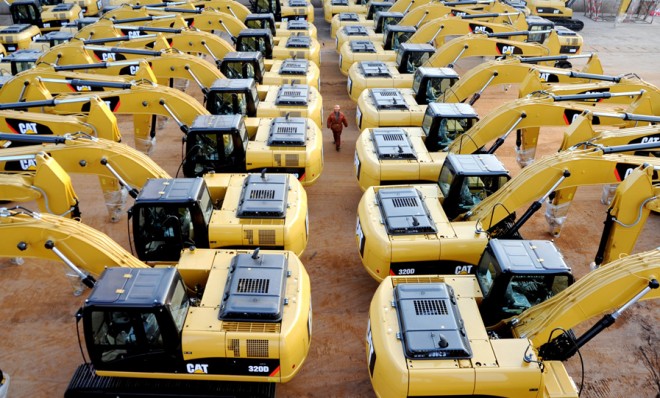Why Caterpillar's profits are plummeting
Apparently, the Hydraulic Shovel and Wheel Tractor Scraper business just isn't what it used to be

A free daily email with the biggest news stories of the day – and the best features from TheWeek.com
You are now subscribed
Your newsletter sign-up was successful
Caterpillar Inc., the largest maker of life-size sandbox toys in the world, has reported a sharp slide in profits for the second quarter in a row, as demand for mining equipment takes a steep downward turn.
The company, which designs, manufactures, markets and sells mining and construction equipment — and is thus seen as a major economic bellwether for the world economy — reported a 45 percent slip in first quarter earnings. That follows a 55 percent drop in the last quarter of 2012.
Caterpillar is still making money — just way less than it used to. In the first quarter, profit clocked in at $880 million, down from $1.6 billion during the same period last year. Overall revenue decreased 17 percent to $13.2 billion, leading the company to lower expectations for the rest of 2013. Caterpillar now expects per-share earnings of $4 on total 2013 revenue between $57 billion and $61 billion, instead of $7 to $9 per share on revenue of $60 billion to $68 billion.
The Week
Escape your echo chamber. Get the facts behind the news, plus analysis from multiple perspectives.

Sign up for The Week's Free Newsletters
From our morning news briefing to a weekly Good News Newsletter, get the best of The Week delivered directly to your inbox.
From our morning news briefing to a weekly Good News Newsletter, get the best of The Week delivered directly to your inbox.
Caterpillar has also announced plans to cut about 2,000 jobs.
The company's slide can largely be blamed on a drop in demand for mining equipment — down 11 percent globally, and a whopping 24 percent in Asia. As the Financial Times’ Neil Munshi reports, "The U.S. shale gas boom has driven down natural gas prices," leading power producers to replace some coal operations with natural gas — and thus require less of Caterpillar's heavy-duty equipment. The other culprit, Munshi says, is the slowdown in economic growth in China — the largest consumer of mined commodities in the world. Industrial growth in China dropped 8.9 percent compared to the first quarter last year, reports The New York Times. And fewer mining projects in China means fewer Hydraulic Shovels and Wheel Tractor Scrapers (see here), which equals less profits for Caterpillar.
The good news (beyond what less coal mining might eventually mean for China's notoriously poor air quality): Caterpillar remains optimistic when it comes to its American business. Chairman and CEO Doug Oberhelman said in a release, "In the United States, we are encouraged by progress so far and are becoming more optimistic on the housing sector in particular."
A free daily email with the biggest news stories of the day – and the best features from TheWeek.com
Carmel Lobello is the business editor at TheWeek.com. Previously, she was an editor at DeathandTaxesMag.com.
-
 Political cartoons for February 19
Political cartoons for February 19Cartoons Thursday’s political cartoons include a suspicious package, a piece of the cake, and more
-
 The Gallivant: style and charm steps from Camber Sands
The Gallivant: style and charm steps from Camber SandsThe Week Recommends Nestled behind the dunes, this luxury hotel is a great place to hunker down and get cosy
-
 The President’s Cake: ‘sweet tragedy’ about a little girl on a baking mission in Iraq
The President’s Cake: ‘sweet tragedy’ about a little girl on a baking mission in IraqThe Week Recommends Charming debut from Hasan Hadi is filled with ‘vivid characters’